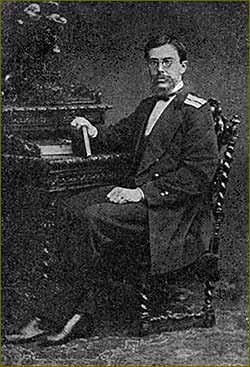01.15.2014 19:54

Classical music has always been one of the pillars of Russian culture. Even hearing these words you can’t help thinking of Tchaikovsky, Prokofiev or Stravinsky. There is, however, one composer whose name is not so well-known abroad but thanks to whom in the 19th century the music world began its deeper discoveries of the Russian style. This year marks the 170th birth anniversary of Nikolay Rimsky-Korsakov.
A member of the group of composers known as The Mighty Five, he was a master of orchestration. His best-known orchestral compositions - Capriccio Espagnol, the Russian Easter Festival Overture, and the symphonic suite Scheherazade - are staples of the classical music repertoire, along with suites and excerpts from some of his fifteen operas. Scheherazade is an example of his frequent use of fairy tale and folk subjects.
Rimsky-Korsakov believed in developing a nationalistic style of classical music, which employed Russian folk song and lore along with exotic harmonic, melodic and rhythmic elements in a practice known as musical orientalism. To mark the 170th anniversary of composer’s birth two main Russian music halls – the Moscow Bolshoi and Saint-Petersburg’s Mikhailovsky theatres - chose to stage his tenth opera “The Tsar's Bride”. The opera in four acts is based on a drama of the same name by Lev Mey. Its first performance took place in 1899 at the Moscow Private Opera Society. Rimsky-Korsakov himself said of the opera that he intended it as a reaction against the ideas of Richard Wagner. This February “The Tsar’s Bride” will be revived on the Main Stage of the Bolshoi theatre. European concert halls will also join in the celebrations.
This year The Tsar’s Bride will appear on stage of the Berlin State Opera and Milan’s La Scala. Barcelona’s opera house Liseo will stage another Rimsky-Korsakov’s famous piece -The Legend of the Invisible City of Kitezh and the Maiden Fevroniya, while Norwegian music-lovers will enjoy the production of The Golden Cockerel.
Rimsky-Korsakov left a considerable body of original Russian national compositions and shaped a generation of younger composers and musicians. While Rimsky-Korsakov's style was based on those of Glinka, Balakirev, Hector Berlioz, and Franz Liszt, he transmitted this style directly to two generations of Russian composers and influenced non-Russian composers including Maurice Ravel, Claude Debussy, Paul Dukas and Ottorino Respighi. Rimsky-Korsakov was undoubtedly one of the most important composers of his time, whose heritage still attracts musicians, artists, writers and stage directors across the world.
News source: The Voice of Russia
 Print this news Print this news
Culture news archive for 15 January' 2014.
Culture news archive for January' 2014.
Culture news archive for 2014 year.
|